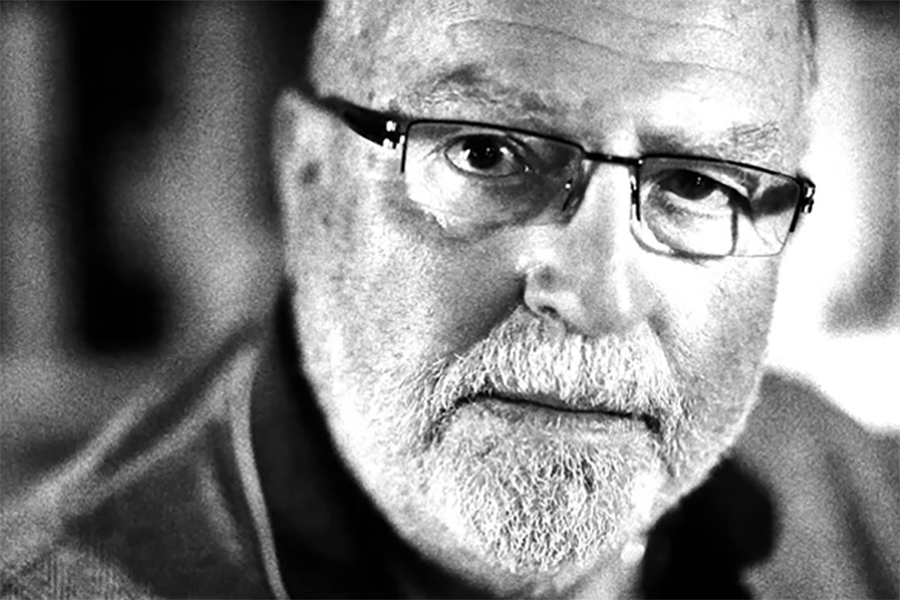Rafe Mair swapped his seat at the provincial cabinet table in Victoria for one in a radio studio in Vancouver. Only in British Columbia would that be a promotion.
The well-known broadcaster and author died Monday morning, his family said. He was 85.
Mair did not become a radio talk show host until age 49 in 1981, by which time the lawyer had served five years in the B.C. legislature and held four different cabinet portfolios, as well as responsibility for constitutional affairs.
He found a larger following and greater sway behind the microphone.
For more than 20 years, Mair invited a procession of politicians and others onto his radio hot seat, were he would he’d batter them with a trademark patter of tough questions delivered in a rapid, staccato style. His legal background made him adept at treating “guests” in an adversarial and inquisitorial manner.
His fans — and they were legion — cheered a kindred spirit whom they saw as a champion of common-sense concerns. His detractors heard an irascible, opinionated scold. (The columnist Hubert Beyer once described him as a “bombastic open-line host with slight leanings toward megalomania.”) It was hard to be neutral about Rafe.
“I am a prickly, hard-to-get-along-with bugger with an excess of pride and, I suppose, ego,” he acknowledged in his memoir.
His self-regard was not insubstantial, as his online biography cites his expertise on jazz, the law, baseball trivia, constitutional affairs and Winston Churchill.
He shared with his audience his personal struggles with anxiety and depression, an admirable effort on his part to use his celebrity to help remove the stigma from mental illness.
A fly-fisherman whose preferred practice was catch and release until he decided even that was cruel, Mair was an outspoken advocate for the environment, especially for salmonids and the great British Columbia rivers in which they spawn. He opposed fish farms and successfully fought Alcan’s Kemano Completion Project, which threatened the salmon-bearing Nechako River.
History will remember him as the chief pitchfork-wielder and torch-carrier of the populist mob that arose to oppose the constitutional reforms known as the Charlottetown Accord. Put to a referendum, the package was rejected by 68.3 per cent of British Columbia voters, the largest margin of defeat in the country, no doubt owing to Mair’s over-the-air campaign. For all his unbreakable opinions about how best to govern Canada, his stated perceptions of Eastern Canada rarely went beyond predictable cliché, and he offered even less insight about Quebec. By his own admission, he felt more a British Columbian than a Canadian.

Mair was a proud contrarian. All governments were phoney, all liberties imperilled, all proclamations of democracy a sham. He tested the patience of his radio employers. He had no kind words for the bloodless corporate culture of Corus Entertainment even before the company suddenly terminated “The Rafe Mair Show” on CKNW one morning in June, 2003. Mair was proud to have been fired three times, taking it as the burden, if not the reward, for someone who claimed to have never kowtowed to advertisers, corporate suits, or the elites. He declared himself to be “the remaining survivor of the shit-disturbing clan in Canada.”
Kenneth Rafe Mair was born in Vancouver on New Year’s Eve, 1931. His parents, Frances Tyne (née Leigh), known as Frankie, and Kenneth Frederick Robert Mair, a salesman born in Auckland, New Zealand, had married at St. Paul’s Church in Vancouver 16 months earlier. He attended Maple Grove Elementary in Kerrisdale until his parents enrolled him in Grade 5 in St. George’s School, a private boy’s school where he became a cricket player. He later returned to the public system, graduating from Prince of Wales High in 1949 before embarking on a “checkered career in arts” at the University of British Columbia. This was followed by law school from which he graduated in 1956, “not with distinction but in the top third” in a distinguished class including, from the letter B alone, Tom Berger, Ron Basford, Tom Braidwood and Peter Butler.
Mair worked briefly for a lumber company and in the oil industry in Edmonton before spending three years as a claims adjuster with an insurance company.
In 1960, he began articling with Vancouver lawyer Tom Griffiths, “a guy after my own heart,” Mair wrote in his 2004 memoir, “a guy who assumed that the establishment was peddling a load of horse buns until the contrary had been clearly demonstrated.” Called to the bar a year later, the young lawyer handled many personal injury cases.
A scratch golfer, Mair also had a reputation for being hotheaded on the course and one tale of a Mair tantrum at the Quilchena Golf and Country Club became legendary.
“He chucked his bag of clubs into the lake in front of the clubhouse and stormed into the men’s lounge,” the golf historian Arv Olson recounts in Backspin. “Several drinks later, vowing never to play again, he left the clubhouse, cursing as he fumbled through his pockets. Then he remembered. Before teeing off, he had put his car keys in his golf bag for safekeeping. To the delight of clubhouse onlookers, Mair removed his shoes and socks, rolled up his pants and waded into the pond. He dragged the clubs out with considerable difficulty. Upon removing his keys from the side pocket, he heard someone shout gleefully, ‘We knew you wouldn’t quit for more than 24 hours.’ Mair promptly flung the clubs back into the pond, found the parking lot and drove off.”
He served a stint as president of the club, during which time discriminatory bans on non-white membership were rescinded.
In 1969, he moved his family to Kamloops to join the practice of his law school classmate Jarl Whist, a fellow Liberal who twice earlier in the decade had lost election to the House of Commons to E. Davie Fulton of the Progressive Conservatives.
Mair squabbled with the Law Society of British Columbia over his handling of a murder case in which he resigned as defence counsel for a youth charged in a beating death. He quit the case because he did not want to face the financial burden of being paid just $50 per day from legal aid when “it costs me more than $100 a day just to pay my staff and rent on the office.” Mair contested a reprimand issued by the society without a hearing.
In 1973, Mair represented Friar Tuck’s, a Kamloops drinking establishment which offered exotic dancing as entertainment. When a dancer named Linda Adams removed her panties, she wound up in court facing indecency charges.
The dancer was represented by lawyer Peter Jensen, while Mair handled the case for Friar Tuck’s. Part of the legal test was whether Adams had violated “community standards” in Kamloops, a city the newspaper columnist Jack Knox would later describe jokingly as “Amsterdam-on-the-South-Thompson.”
Mair turned the issues into good sport, making a police officer on the stand examine crotch shots in magazines available for purchase in Kamloops. He also had the hapless officer, who more than once used the word “gentile” when he meant “genital,” read aloud from the most salacious passages from The Happy Hooker, a sex worker’s memoir also available for sale in the city. John Pifer, a local entertainment reporter and patron of Friar Tuck’s, was sworn in as an expert witness, even though, as Mair would later recount, “a less likely candidate as an expert on Kamloops’ moral tolerance was hard to find.”
The dancer was found guilty and fined $1, a verdict overturned on appeal. The lawyers accepted the dollar as part of their legal fees, flipping a coin to determine who got to keep the cheque. Mair lost, but found solace in having established bottomless dancing as artistic expression.
Elected to Kamloops city council, he soon set his sights on Victoria, as he ardently opposed the NDP government of premier Dave Barrett. He won the Social Credit nomination for Kamloops in May 1975 before defeating NDP incumbent Gerry Anderson in December by 14,639 votes to 10,975. Mair won re-election four years later over a different NDP challenger by 3,309 votes.
Mair described himself at the time as “a reasonably bright lawyer with a big chip on his shoulder when it came to authority.” He liked to say the first time he ever voted Social Credit was for himself.
The newly elected MLA was intimidated by Bill Bennett, his party leader and new premier whose “tough guy” persona contributed to his surviving in office for 11 years. Bennett named Mair consumer affairs minister (later renamed consumer and corporate affairs), a provocative posting for someone who considered bankers to be “mostly greedy, malicious, unfair, grasping and overly eager to seize all those assets the poor borrower had pledged.” Mair hired his friend, and longtime federal Liberal, Tex Enemark, as deputy minister, embarking on an ambitious program of reforms. Not for nothing did some of his fellow Socreds call him “Red Rafe.”
He later held both the health and environment ministries, where he negotiated an agreement to save the Skagit River from being turned into a lake to provide hydroelectric power to Seattle.
The lawyer relished the give-and-take of insults and jibes on the floor of the legislature, but later confessed embarrassment at having been caught on camera in the corridors screaming, “You slanderous bastard!” at the NDP’s Alex Macdonald, a former attorney general.
For four years, Mair also handled constitutional affairs at a time when the topic roiled Canadian political discourse. His experiences with his counterparts in Eastern Canada did not warm him to his fellow Canadians, whom he felt did not understand British Columbia and ignored, or ridiculed, its concerns concerns.
One lesson he said he learned — Canadian premiers are “one-man dictators controlled by corporate money.”
Such bald statements do not make for good statecraft, but they are money in the bank for radio talk-show hosts.
In 1981, he walked away from electoral politics and into the the studio of radio station CJOR, where he hosted an eponymous, three-hour-long, morning public affairs talk show. His first star guest was Progressive Conservative leader Joe Clark on a long-distance telephone call.
Mair’s arrival at the station, owned by Jimmy Pattison, bumped Pat (“Go ahead, doll”) Burns from the coveted morning slot to an evening show. Burns was an original “dollar-a-holler” radio host, credited by some as the creator of the open-line format. Mair set out to make the show a forum for forthright opinions on the issues of the day. He had mixed success, as his shows still included such oddities as numerologists.
CJOR badly trailed CKNW, long the “top dog” among Vancouver’s private radio stations. Not long after CJOR fired Mair in 1984 (replacing him with former NDP premier Barrett, which must have stung), he was hired by ’NW, hosting “Nightline B.C.” in the midnight to 2 a.m. slot.
He brought him with a modest but growing audience, and moved from the midnight slot (1984-85) to an early evening slot (1985-86) to an early afternoon slot (1986-88) to Vancouver talk radio’s prime time from 8:30 to 11 a.m. on Sept. 1, 1988. He held that spot for almost five years with the highest-rated radio program in Western Canada.
The radio studio provided a pulpit from which Mair launched memorable crusades — from praising Paul Watson as an environmental warrior to fighting fish farms to halting the Kemano Completion Project to exposing bureaucratic incompetence to rousing the rabble in opposition to constitutional proposals from those he saw as Eastern elites.
The station was three times a finalist for prestigious Michener Award for public service during his stint at CKNW. The station won in 1994 for crusading to cancel the billion-dollar completion of the Alcan’s Kemano power project. The citation described Mair as “a potent force” in the campaign in which fishing and environmental concerns triumphed over economic ones.
The radio station earned a Michener citation of merit in 1990 for Mair’s reports on poor practices by the province’s social services ministry. The radio host targeted hasty foster-home placements and other ill-conceived practices, causing the government to investigate five specific cases while also undergoing a general review of its performance. The station also received a citation in 1989 for a documentary on the dangers of substance abuse.
In 2003, Mair received the Bruce Hutchison Lifetime Achievement Award from the Jack Webster Foundation.
Fired by CKNW in 2003, Mair bounced back months later on AM600 (the former CJOR). “If that’s retirement, you can have it,” he said in his first broadcast after being off the air for two few months. He had a smaller audience and less influence, though he hardly slowed in his prolific production.
Throughout his radio career, he remained a busy writer, publishing columns in the Province, the Financial Post, Georgia Straight and other publications, including The Tyee, since 2005.
He also became a familiar commentator on television while maintaining an active web presence at www.rafeonline.com, not to mention writing several popular books, from The Last Cast, a collection of fly-fishing reminiscences to the appropriately titled, Rants, Raves and Recollections to Canada: Is Anyone Listening?, a national bestseller in which he offered yet more reflections on Quebec nationalism and the state of the nation.
A great tragedy in his life was the death of his 17-year-old daughter Shawn in 1976. She died of head injuries after the car she was driving veered across the road and crashed head-on into a truck. Her blood alcohol level was over the legal limit. The aftermath of the death contributed to the breakup of his marriage to the former Evelyn MacInnes. He later married Patti Ballard (née Patricia McMicking), who was for many years his producer. “I wouldn’t want to answer under oath for all my behaviour during our marriage,” he wrote in his memoir. They divorced.
Mair proposed to his third wife, Wendy, just four days after meeting her. They wed in 1994, establishing a home in Lions Bay.
His voluminous contributions to The Tyee included the usual Mairian bêtes noires — fish farms, independent power producers, the constitutional status quo, corporate control of the mass media. He had a notable hiccup in a Yuletide column in 2007 on the treatment of two cartoonists by the Province newspaper that included errors. Online corrections and an apology did not assuage Canwest (now Postmedia), which pursued a libel suit for several months before settling for legal costs and a modest charitable donation by The Tyee.
One of his more remarkable Tyee columns described how his family had benefitted when his father purchased, at low cost, a paper-box factory from the trustee handling the property of Japanese-Canadians interned during the Second World War.
“It’s fair and accurate to say that I was fed, clothed and educated on assets literally stolen from the true owners. It is part of me that I can never be rid of,” he wrote. As always, he called ’em as he saw ’em.
Rafe Mair was a one-man operation with a simple product — his opinion — and it can be said he never ran low on supply. ![]()
Read more: BC Politics
















Tyee Commenting Guidelines
Comments that violate guidelines risk being deleted, and violations may result in a temporary or permanent user ban. Maintain the spirit of good conversation to stay in the discussion.
*Please note The Tyee is not a forum for spreading misinformation about COVID-19, denying its existence or minimizing its risk to public health.
Do:
Do not: